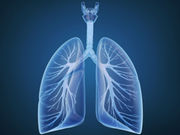Respiratory symptoms also associated with increased odds of incident and restrictive physiology
FRIDAY, Feb. 2, 2018 (HealthDay News) — For young adults, persistent respiratory symptoms are associated with accelerated decline in lung function, according to a study published online Jan. 25 in the American Journal of Respiratory and Critical Care Medicine.
Ravi Kalhan, M.D., from the Northwestern University Feinberg School of Medicine in Chicago, and colleagues examined the correlation between respiratory symptoms, loss of lung health, and incident respiratory disease in a study of 2,749 participants in the Coronary Artery Risk Development in Young Adults study. Participants completed respiratory symptom questionnaires at baseline and two years later.
The researchers found that in models assessing decline in forced expiratory volume in one second (FEV1) and forced vital capacity (FVC) from year five to year 30, incident obstructive and restrictive lung physiology, and visual emphysema, cough or phlegm, episodes of bronchitis, wheeze, shortness of breath, and chest illnesses at baseline and year two were the main predictor variables. Report of any symptom was associated with −2.71 mL/year excess decline in FEV1 and −2.18 in FVC, after adjustment for covariates; in addition, greater odds of incidence (pre-bronchodilator) obstructive and restrictive physiology were seen (odds ratios, 1.63 and 1.40). There was a correlation for cough-related symptoms with increased odds of future emphysema (odds ratio, 1.56).
“Persistent respiratory symptoms in young adults are associated with accelerated decline in lung function, incident obstructive and restrictive physiology, and greater odds of future radiographic emphysema,” the authors write.
Abstract/Full Text (subscription or payment may be required)
Copyright © 2018 HealthDay. All rights reserved.








